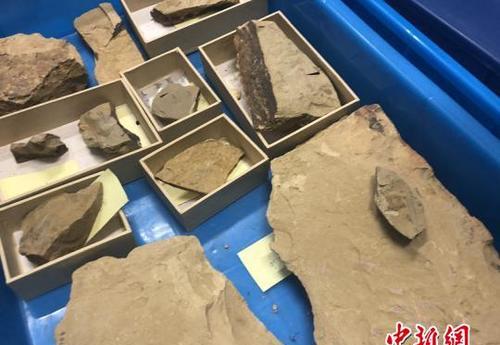
The picture shows some of the fossils in this study. Photo by Yang Yanci
Nanjing, October 10 (China News Service) -- The Nanjing Institute of Geology and Paleontology of the Chinese Academy of Sciences released a news on the 10th that the international scientific research team composed of researchers from Durham University in the United Kingdom has confirmed the "kinship" of this "deep-sea ice cream" soft-tongue snail animal through research on the new tax group of soft-tongued snails in the Chengjiang biota of 518 million years ago in the Cambrian period in China.
The picture shows the fossil of "Yunnan meat stem snail" in this study. Photo by Yang Yanci
This result has been published in proceedings of the royal society b: biological sciences.
In the cambrian period of the ocean, the soft tongue snail was the main food source for many predators, so it was also vividly called "seabed rice" by researchers. Compared to many large, gorgeous-looking marine species, the soft-tongued snail has an unremarkable appearance, with a cone-shaped shell wrapped around the soft body, resembling a miniature version of an "ice cream cone."
According to researchers, the soft-tongued snail is the earliest symmetrical animal representative of the two sides with mineralized shell on the earth, which was particularly prosperous in the Cambrian Period. Due to the lack of anatomical information such as mollusk tissues, the position of this taxon in the animal system tree has long been controversial and uncertain.
Recently, Sun Haijing and Zhao Fangchen, researchers from the research group of Zhu Maoyan, Nanjing Institute of Geology and Paleontology, Chinese Academy of Sciences, collaborated with Dr. Martin Smith of Durham University in the United Kingdom to conduct morphological and systematic studies on the "Yunnan meat stem snail" in the Chengjiang biota, indicating that soft-tongued snails are related to brachiopods.
The picture shows the "Yunnan meat stem snail" in the Chengjiang biota. Courtesy of Nangu Institute
Sun Haijing said that the "Yunnan meat stem snail" is fixed on the seabed through the meaty stem structure at the beginning, and feeds organic particles through the tentacles. The solid structure of this species is very similar to the fleshy stem characteristics of brachiopods, and the symmetrical mouth caps and cone shells on both sides can be compared with the dorsal abdominal shells of brachiopods. This new finding provides important evidence for resolving the systematic relationships of soft-tongued snails.
The picture shows the restoration of "Yunnan meat stem snail". Courtesy of Nangu Institute
"In order to accurately analyze the systematic classification location of the soft-tongued snail, we established a dataset of 54 genera and 225 morphological characteristics covering 11 related fauna, and applied a minimalist method to carry out biological lineage analysis." Sun Haijing said that the results showed that the soft-tongued snails were monophyletic groups, similar to the brachiopod phylum. Both have the characteristics of solid fleshy stem structure, symmetrical double-petal shell body configuration on both sides, and closed filter chamber.
Schematic diagram of the phylogenetic location of the yunnan meat stem snail (the picture of the living animal is from the network). Courtesy of Nangu Institute
Sun Haijing added that the study confirmed that the "Yunnan meat stem snail" belongs to the original type of soft-tongued snail. Although this "ice cream on the seafloor" is similar to brachiopods, it lacks the cognate traits of brachiopod crowns and may therefore belong to the ancestral type of brachiopods (stem groups).
This study was jointly funded by the Pilot Project of the Chinese Academy of Sciences, the National Natural Science Foundation of China and the China-UK Cooperation Project. (End)